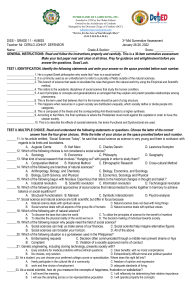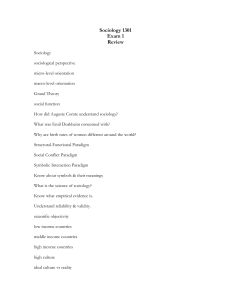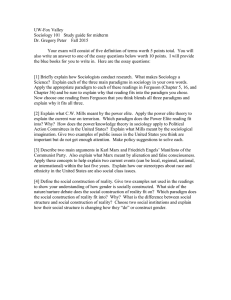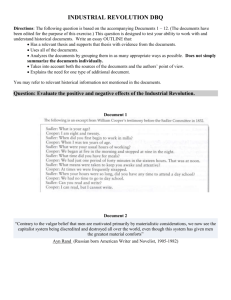Origins of Sociology
advertisement
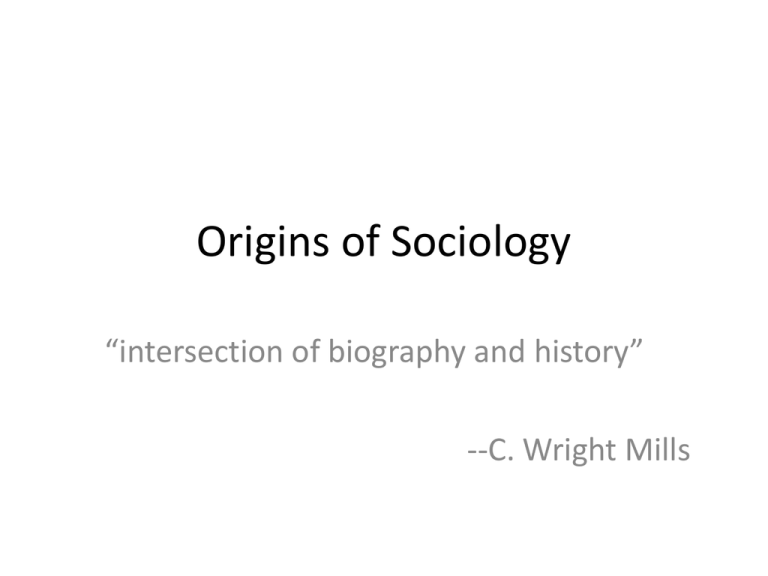
Origins of Sociology “intersection of biography and history” --C. Wright Mills Origins • Social thinkers & religious leaders have long made observations about human behavior but the first formal analysis dates to ancient Greece – Plato & Aristotle 400-300BCE • they often based their answers on superstition, myth, or even the positions of the stars • they did not test their assumptions Revolution=Paradigm Shift Scientific Revolution & Age of Enlightenment 17th century – Created a rapid change in thinking, need for scientific understanding of world and behaviour – Shift away from the church to provide answers – Increased political, technological and social change achievement Key Figures: Copernicus, Brahe, Kepler, Galilei, Bacon, Descartes, Newton Revolution=Paradigm Shift Industrial Revolution 18th & 19th century • agriculture gave way to factory production • masses of people moved to cities in search of work • new social class of industrialist emerged • created massive social upheaval Revolution=Paradigm Shift • people of diverse backgrounds now worked together • people became consumers instead of producers • rent for shelter instead of service or barter for shelter • social problems arose – housing, overcrowding, unsanitary conditions, poverty, pollution, crime, child labour, hazardous working conditions, no job security • there emerged a new group of social thinkers trying to figure out all of this social change Revolution=Paradigm Shift American & French Revolutions (1775, 1789) • swept away the existing social orders and rules • idea that individuals possess inalienable rights • many traditional Western monarchies to give way to more democratic forms of government Revolution=Paradigm Shift Imperialism • Europeans had conquered many parts of the world, and their new colonies stretched from Asia and Africa to North and South America. • Exposed to radically different ways of life, they began to ask why cultures differ. Auguste Comte (1794-1859) • Coined the term SOCIOLOGY “socius” (social, being with others) “ology” (study of) • Never conducted sociological research, but considered by many to be the founder of sociology • Stressed that methods for natural sciences should be applied to study of society • POSITIVISM- the belief that the world can be best understood through scientific inquiry Herbert Spencer & Social Darwinism 1820-1903 • born into a more peaceful time than Comte • major contribution was an evolutionary perspective on social order • Evolutionary Theory- A theory to explain the mechanisms of organic social change • Society like a biological organism has various independent parts that contribute to its functioning (family, economy, and government) that work to maintain stability and survival of the entire species • He believed that society struggled for existence and fitness – “Survival of the fittest” • This phrase is often attributed to Charles Darwin and is therefore called Social Darwinism • He strongly opposed any measures that would alter natural selection and damage society by favoring its weakest/ less worthy members • Many critics argued that his theory did not account for the fact that people can alter their environments and that it is too easy to justify concepts such as class and racial and ethnic and gender inequality Karl Marx (1818-1883) • Emphasis on change and conflict • History is a continuous clash between conflicting ideas and forces • Conflict (especially class conflict between social classes) is necessary in order to produce social change and a better society • According to Marx, class conflict=struggle between the capitalist class (bourgeosie who own and control the means of production) and the working class (proletariat who sell their labour in order to live) Emile Durkheim (1858-1917) • People are the product of their social environment therefore the limits of human behaviour/potential are socially, not biologically based • economic activity bonds people together through interdependence • Strains and breakdown in modern society lead to anomie during a period of rapid social change – a condition in which social control becomes ineffective as a result of the loss of shared values and of a sense of purpose in society) • Explored subject of suicide Max Weber (1864-1920) • Disagreed with Marx’s idea that economics is the central force in social change, but thought it was important in shaping human action • Thought that economic systems are heavily influenced by other factors in society (such as religion) • Emphasized that sociology should be value free (research should be conducted in a scientific manner and should exclude the researcher’s personal values and interests), but recognized that social behaviour cannot be analyzed or measured like temperature or weight) • Believe that sociologists should employ verstehen (German word for understanding or insight) to gain the ability to see the world as others see it; this idea has been incorporated into the concept of the Sociological Imagination • Weber was concerned with bureaucracy, and said it was the most significant factor in determining social relations among people in industrial societies; used to maintain capitalist interests in society • More aware of women’s issues than many of the other scholars of his day References • Henslin • Text • Wikipedia
